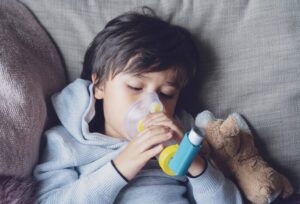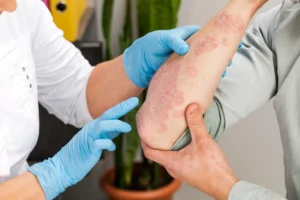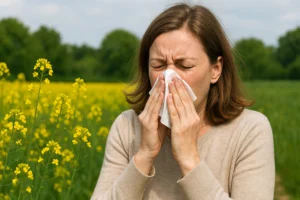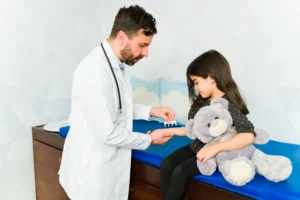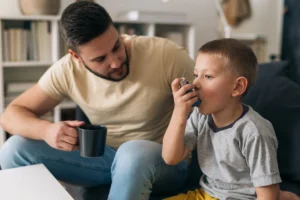Table of Contents
Having a child with childhood food allergies can feel overwhelming. Suddenly, you need to be vigilant about things you may have never paid attention to before, like food labels and ingredient lists. You will need to learn how to use an EpiPen (epinephrine auto-injector for treating severe allergic reactions), and your child may need frequent visits to the allergist and even daily medications like antihistamines or immunotherapy doses. If your child has multiple food allergies, preparing foods that are safe and healthy for them to eat can be a challenge. Depending on the way your child’s handles allergens, you may also have a detailed skin care routine to adhere to. So it’s no wonder that the management of food allergies can seem overwhelming!
Even as parents and caregivers gain knowledge and get used to handling all that comes with food allergies in their own home, the reality is that venturing out into the rest of the world is unavoidable. Avoiding certain scenarios just to prevent accidental exposure will eventually impact the quality of life for children with food allergies. It is important that families learn to navigate spaces like school, restaurants, birthday parties, and summer camp with careful planning in order to stay safe and enjoy these typical aspects of childhood even with allergies to food. Here are a few common social scenarios and measures to take for safe participation of your child with food allergies.
At Home
Adjusting to having someone with a food allergy at home must include the entire family. Everyone in the house will need education about the allergy, and standard rules must be created to help avoid accidental exposure. If an allergen can be completely removed from the house, this is the ideal situation. However, this is not always possible or desirable, particularly if your child has multiple allergies, so if an allergen is not completely removed from the home then those food items should be stored in a separate place from the rest of the food items. Foods should be clearly labeled as safe and unsafe even if they are stored separately, just in case something is put away incorrectly. Unsafe foods should be kept out of reach of young children who may not yet have a good understanding of what foods to avoid.
Since 2004, the U.S Food and Drug Administration has required all food labels to clearly list if a food contains one of the eight most common major food allergens (milk, eggs, fish, shellfish, tree nuts, peanuts, wheat, and soy) or may have been cross contaminated during production or packing. Effective January 1, 2023, the FDA added a 9th food allergen, sesame, to the list of ingredients that must meet manufacturing and packaging requirements as well as be clearly identified in packaged food and drinks.
When reading ingredient lists to determine the safety of a food, it is important to realize that the allergen may be “hidden” under another ingredient name. For example, ingredients like albumin, mayonnaise, or meringue are egg-derivatives and should be avoided by children with an egg allergy. Soy is present in such ingredients as tofu, miso, tempeh, and edamame. Learning the “hidden” ingredients for your child’s allergen can be done with the help of your allergist. If food packaging does not contain an ingredient list, keep it out of the house. Good handwashing as well as thorough dishwashing in between handling safe and unsafe foods is a necessity.
Reviewing the signs of an allergic reaction with all members of the family, and how to call for help, is an important skill set to review even with other children. All adults and children who are old enough should be taught where the EpiPens are kept and how to use them if needed for severe allergic reactions. EpiPens should be checked periodically for lapsed expiration dates and replaced as needed.
Empowering Your Child
Before even considering how to handle the scenarios listed below, educating your child and empowering them to play a role in managing their food allergies is an important and necessary step and can never be started too early. Obviously, children should never be the primary person in charge of managing food allergies, but their participation and vigilance is an additional safety measure and could help avoid accidental exposures.
Children should be taught the names of the foods they are allergic to and that consuming those foods will make them sick. Starting this conversation early is a good idea because, even if your child cannot yet talk, hearing about their allergy to foods from an early age will make it familiar and routine information to them and they will easily be able to relay it as they get older. Consider getting a medical alert bracelet for young children to wear and teach them to show it to other adults before accepting food outside of the house.
You can teach preschool age children to ask, “Does this have peanuts in it?” or to tell another adult serving them food, “I have allergies.” Learning to carry and use an EpiPen is within the abilities of school age children and should be reviewed every few months. Older children and teens can be taught to read food labels and ingredient lists and take a more active role in their health and food allergy management.
Daycare and School
The most common place food allergies must be addressed outside of the home is daycare or school. For infants, they may even be attending daycare before their food allergies are diagnosed! Public schools and health-department-certified daycare facilities will all have standard care measures in place for handling food allergies. You can request to meet with administrators prior to enrolling your child to review their protocol for handling food allergies. Common allergens like peanuts are often not allowed in these facilities during meals or snacks, or a designated “peanut free” area may exist in areas where food is served. Outside snacks such as treats for birthday parties are typically required to be store-bought and come in the original packing with an ingredient list.
A Food Allergy Action Plan, also known as FARE’s Food Allergy & Anaphylaxis Emergency Care Plan, is often required to be filled out by your child’s pediatric allergist or pediatrician and lists their allergens, possible symptoms of a reaction, and steps to be taken after an exposure, including use of epinephrine. An EpiPen can be kept in the nurse’s office for your child, or carried with your child if they are confident in their ability to use it.
Private school standards are not regulated the same as public facilities and thus may not be consistent in how they handle allergies or other health concerns, so if the school or daycare you are considering does not seem to have safe protocols in place or seems unable or unwilling to accommodate your child’s needs, consider alternative facilities that may be more suited to handling pediatric food allergies.
Birthday Parties
Birthday parties are a common and fun part of childhood and food allergies should not keep your child from being celebrated by their friends and family or attending a party for others. If you are hosting a birthday party for your child, you can make sure the available foods are allergy-friendly and substitute any cake or cookie recipes for allergen-free versions. The internet makes baking with food allergies much easier than previous generations as a variety of recipes and suggestions are available with a simple search. Just make sure anyone helping with the party knows not to bring treats or foods containing your child’s allergen. If you have a collaborative allergy provider that works with a dietician, especially an online or telehealth allergist that is readily available to address your concerns about your child’s food allergy, you can also ask for food recommendations and substitutes during your appointments. And be sure to label foods and avoid contamination if the food contains any of the nine major food allergens (milk, egg, peanuts, soybeans, fish, tree nuts, wheat, crustacean shellfish, sesame).
Hosting an allergy-friendly party may be a welcome relief to other parents who have children with allergies. There are many things you can do to take the worry and stress out of attending a birthday party with allergies, such as using party prizes like stickers or small toys instead of candy.
If your child is invited to a birthday party, you will want to get in touch with the adult in charge of the party before you RSVP. You can explain your child’s allergies and ask what types of foods or treats will be served. You can use that information to decide if it is safe for your child to attend, if they will need to bring their own separate food or snacks, or if the level of supervision at this party means you need to skip this time. If your child does get to go, you can briefly review signs of an allergic reaction and use of an EpiPen with the host prior to dropping your child off if you cannot stay for the party. Also make sure to give the host your phone number and any other pertinent information.
Playdates and Sleepovers
As children get older, they will inevitably be invited to spend time with friends outside of school or daycare. One of the best ways to allow your child this important social interaction while remaining safe is to host these types of gatherings yourself. By hosting, you are able to control what food is available and ensure that EpiPens and adults knowledgeable about your child’s food allergies are present in case of an emergency. This is a great way to ease your child into this type of gathering safely. You should also always be sure to ask the parents or caregivers of other children coming to your house if they have any food allergies so you can be adequately prepared to meet the allergy needs of your young guests.
In the event your child is going to visit another child’s house without you, more preparation will be needed. You will want to reach out to the parent supervising the gathering to talk about your child’s food allergy and ask if they are comfortable helping your child avoid their allergen. You should also ask if they are comfortable being shown how to use an EpiPen and using one if needed. If an allergen-containing food is being served, or if you want to avoid the risk of accidental exposure altogether, you can send your child with their own food in clearly labeled packaging.
As always, you will want to coach your child to remember their allergens and to ask about any ingredients before accepting food at someone else’s house. In the event you are uncomfortable with another family’s willingness or ability to properly supervise your child and available food, it is always okay to decline an invitation and perhaps arrange for a safer social gathering for your child.
Camps and Sports
A great way to ensure an appropriately trained adult is available at your child’s camp, sports practice, or game is to volunteer as a coach, leader, or helper if you are able. If you are not able to participate or be there the entire time your child is in attendance, you will want to speak with camp staff or coaches and make sure they are aware of your child’s food allergy and symptoms they may experience if having a reaction. Often staff members in settings like this are trained in emergency action such as using epinephrine, but you should still ask and offer to provide training if they are not familiar with using an EpiPen or responding to an allergic reaction.
If snacks are provided, you can offer to bring appropriate foods for everyone or send your child with their own clearly labeled snack. If staying at an overnight camp, you can ask for the planned menu to review the ingredient list ahead of time and ask if any allergy-friendly options are available.
Babysitters and Other Caregivers
Never leave your child in the care of a babysitter, grandparent, or other caregiver who has not been properly educated on your child’s allergens, symptoms to watch for, and emergency action including use of an EpiPen. Preparing food ahead of time or having a list of approved options makes it easier for caregivers to provide safe foods to your child. You can show the caregiver how foods are stored and labeled in your house and which ones are to be avoided.
It’s a good idea to find a babysitter who is first aid or CPR certified, and you can also provide additional training on how to identify signs of accidental exposure and what to do if an allergic reaction occurs, including how to use an EpiPen. Keep EpiPens in an easy-to-access location and remind babysitters where they are before leaving. Remind caregivers that the effects of epinephrine does not last long and emergency medical attention is still needed after an EpiPen has been used, even if symptoms seem to be improving.
Restaurants and Eating at Other Houses
Eating at restaurants or other people’s houses can be particularly challenging as the ingredient list or kitchen conditions and risk of cross contamination may be largely unknown. The internet may make it easier to identify allergen-friendly restaurants and review their menu ahead of time. You can also call and ask to speak to a manager or chef to see if they have any protocol in place to handle allergies and cross-contamination. You should consider carrying a “chef’s card” which is a customizable information card available in a variety of languages that you can take with you and give to your waiter, detailing your child’s allergies and ingredients to avoid.
If your child is eating at someone else’s house, you can ask ahead of time what they plan to make. If you are unsure if the food offered will be safe, you can bring clearly labeled food for your child to eat instead.
Travel
Traveling within the United States should be handled in much the same way as eating at restaurants, with careful planning ahead through a restaurant’s website or by speaking to a manager. It’s a good idea to take safe snacks with you in case of travel delays or unexpected events that lead to difficulty finding pre-approved restaurants.
Traveling internationally can be much more difficult, particularly if there is a language barrier or cultural differences that make food allergy accommodations less common. Researching the country you plan to visit ahead of time and learning their attitude surrounding food allergies and how they handle them, as well as learning a few simple phrases in the local language, can be helpful. Taking pre-packaged, safe food options may be necessary if the ability to verify the safety of local food is not possible.
You should take a few EpiPens with you and keep them in different places just in case your baggage is lost, damaged, or stolen.
Navigating everyday parts of childhood with food allergies can definitely be a challenge, but if done correctly, you can keep your worries minimal and allow your child to participate in these fun events without too much impact on their quality of life. Planning ahead is at the heart of all of these modifications, whether it’s to touch base with another parent, see an ingredient list at a restaurant, or know when to pack separate food for your child. Additionally, teaching your child early on about their allergies, foods to avoid, and questions to ask will add an additional layer of safety to their ventures outside of the house.
There are additional safety measures you can take for food allergy management, especially if your child’s allergies are severe, include many foods, or are negatively impacting their quality of life. There are also different treatment options including food immunotherapy which is a food allergy treatment option that exposes your child to a small amount of their allergen every day, increasing the amount over time. This daily exposure creates a tolerance, allowing your child to consume a bite or two of their allergen before their immune system reacts. While this is not a cure for allergies, it does offer additional safety in situations such as parties, restaurants, and eating at other’s homes where accidental exposure is more likely to occur.
Regardless of the scenario, you can always talk to your child’s food allergist to see what tips and tricks they offer or to see if immunotherapy is right for your family. These extra steps may make daily activities a little more complicated, and management of pediatric food allergies can seem daunting, but taking these necessary steps can certainly help ensure a child a fun and inclusive childhood.



